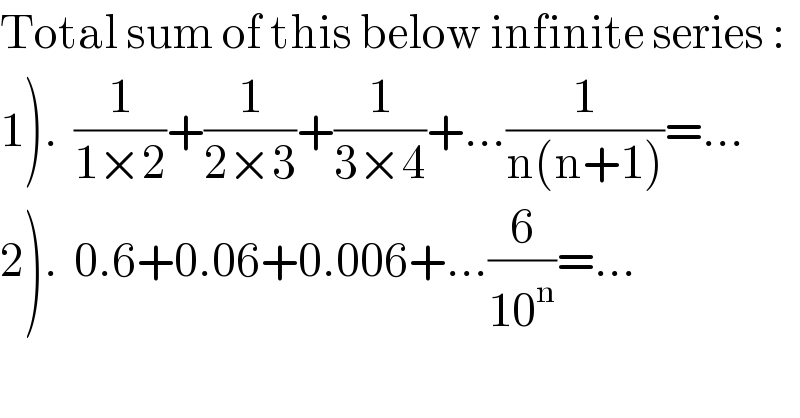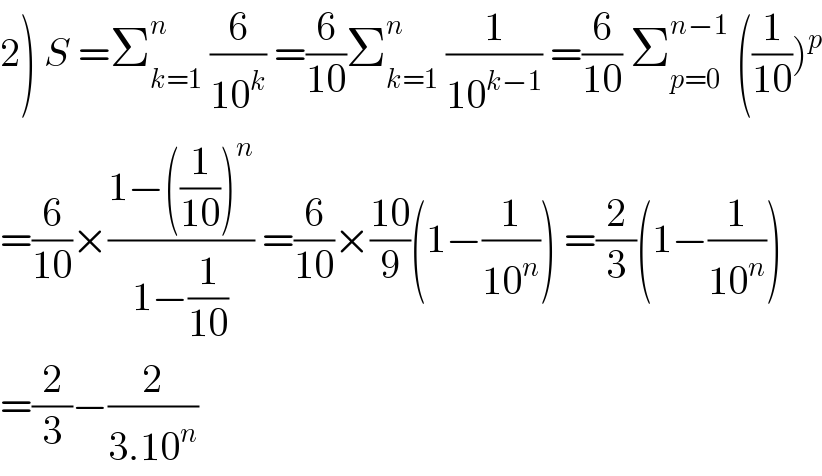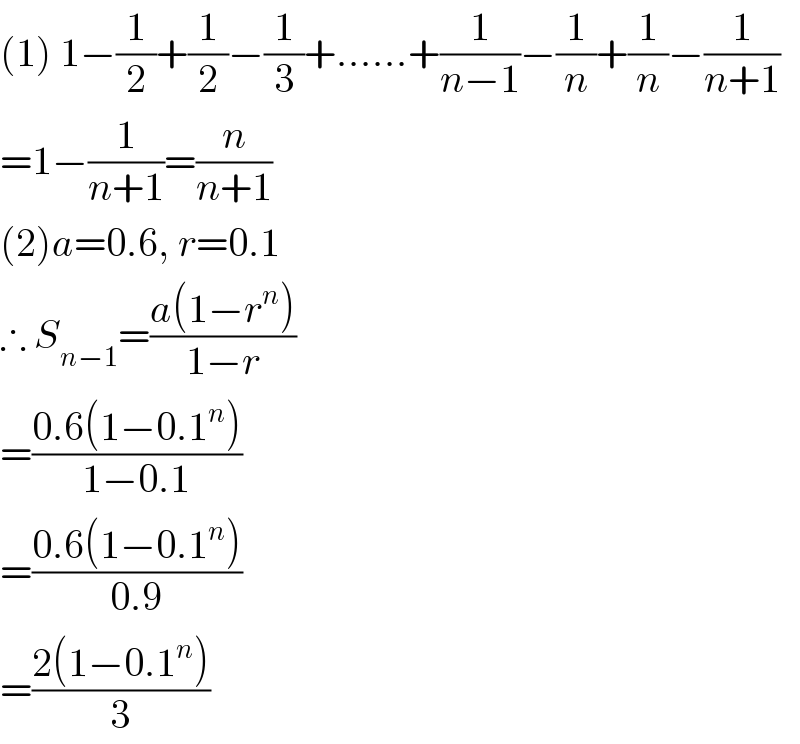Question Number 91796 by zainal tanjung last updated on 03/May/20

$$\mathrm{Total}\:\mathrm{sum}\:\mathrm{of}\:\mathrm{this}\:\mathrm{below}\:\mathrm{infinite}\:\mathrm{series}\:: \\ $$$$\left.\mathrm{1}\right).\:\:\frac{\mathrm{1}}{\mathrm{1}×\mathrm{2}}+\frac{\mathrm{1}}{\mathrm{2}×\mathrm{3}}+\frac{\mathrm{1}}{\mathrm{3}×\mathrm{4}}+…\frac{\mathrm{1}}{\mathrm{n}\left(\mathrm{n}+\mathrm{1}\right)}=… \\ $$$$\left.\mathrm{2}\right).\:\:\mathrm{0}.\mathrm{6}+\mathrm{0}.\mathrm{06}+\mathrm{0}.\mathrm{006}+…\frac{\mathrm{6}}{\mathrm{10}^{\mathrm{n}} }=… \\ $$
Commented by mathmax by abdo last updated on 04/May/20

$$\left.\mathrm{2}\right)\:{S}\:=\sum_{{k}=\mathrm{1}} ^{{n}} \:\frac{\mathrm{6}}{\mathrm{10}^{{k}} }\:=\frac{\mathrm{6}}{\mathrm{10}}\sum_{{k}=\mathrm{1}} ^{{n}} \:\frac{\mathrm{1}}{\mathrm{10}^{{k}−\mathrm{1}} }\:=\frac{\mathrm{6}}{\mathrm{10}}\:\sum_{{p}=\mathrm{0}} ^{{n}−\mathrm{1}} \:\left(\frac{\mathrm{1}}{\mathrm{10}}\right)^{{p}} \\ $$$$=\frac{\mathrm{6}}{\mathrm{10}}×\frac{\mathrm{1}−\left(\frac{\mathrm{1}}{\mathrm{10}}\right)^{{n}} }{\mathrm{1}−\frac{\mathrm{1}}{\mathrm{10}}}\:=\frac{\mathrm{6}}{\mathrm{10}}×\frac{\mathrm{10}}{\mathrm{9}}\left(\mathrm{1}−\frac{\mathrm{1}}{\mathrm{10}^{{n}} }\right)\:=\frac{\mathrm{2}}{\mathrm{3}}\left(\mathrm{1}−\frac{\mathrm{1}}{\mathrm{10}^{{n}} }\right) \\ $$$$=\frac{\mathrm{2}}{\mathrm{3}}−\frac{\mathrm{2}}{\mathrm{3}.\mathrm{10}^{{n}} } \\ $$
Answered by $@ty@m123 last updated on 03/May/20

$$\left(\mathrm{1}\right)\:\mathrm{1}−\frac{\mathrm{1}}{\mathrm{2}}+\frac{\mathrm{1}}{\mathrm{2}}−\frac{\mathrm{1}}{\mathrm{3}}+……+\frac{\mathrm{1}}{{n}−\mathrm{1}}−\frac{\mathrm{1}}{{n}}+\frac{\mathrm{1}}{{n}}−\frac{\mathrm{1}}{{n}+\mathrm{1}} \\ $$$$=\mathrm{1}−\frac{\mathrm{1}}{{n}+\mathrm{1}}=\frac{{n}}{{n}+\mathrm{1}} \\ $$$$\left(\mathrm{2}\right){a}=\mathrm{0}.\mathrm{6},\:{r}=\mathrm{0}.\mathrm{1}\: \\ $$$$\therefore\:{S}_{{n}−\mathrm{1}} =\frac{{a}\left(\mathrm{1}−{r}^{{n}} \right)}{\mathrm{1}−{r}} \\ $$$$=\frac{\mathrm{0}.\mathrm{6}\left(\mathrm{1}−\mathrm{0}.\mathrm{1}^{{n}} \right)}{\mathrm{1}−\mathrm{0}.\mathrm{1}} \\ $$$$=\frac{\mathrm{0}.\mathrm{6}\left(\mathrm{1}−\mathrm{0}.\mathrm{1}^{{n}} \right)}{\mathrm{0}.\mathrm{9}} \\ $$$$=\frac{\mathrm{2}\left(\mathrm{1}−\mathrm{0}.\mathrm{1}^{{n}} \right)}{\mathrm{3}} \\ $$
